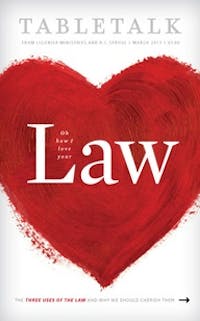
Request your free, three-month trial to Tabletalk magazine. You’ll receive the print issue monthly and gain immediate digital access to decades of archives. This trial is risk-free. No credit card required.
Try Tabletalk NowAlready receive Tabletalk magazine every month?
Verify your email address to gain unlimited access.
The passing of the Oprah Winfrey Show is surely worthy of being described with that most overworked of clichés, as “the end of an era.” Except, of course, it is not the end of an era so much as the morphing of Ms. Winfrey’s career into a new form. It is hard to imagine that the public has seen the last of her, and the values and culture that her show represented are here for the foreseeable future.
I well remember one of my sisters raving about how “Oprah says this, Oprah says that!” in the late nineteen-eighties, which I expect was about the time her show was starting to enjoy international success. At the time, I assumed it was just another bland American show, designed to showcase beautiful people with vast wealth and minimal personality. In fact, of course, the program proved to be far more than that. It was not simply the chat-show equivalent of a soap opera, designed to fill a few idle moments that the viewing public might have in an afternoon; it became a powerful force within wider society.
Take, for example, the idea of Oprah’s Book Club. To give credit where credit is due, many of the books chosen for the club are good reads. I confess that, when something I want to read turns out to be an “Oprah Choice,” I try either to find a copy in the store without the dreaded “O” logo on the front or I order online — like most snobs, I like to think I am not a snob, but things like this rather blow my cover. Yet the fact remains: many of the Oprah choices are good reads, and no one can deny that, whatever the motivation, encouraging people to read is on the whole a good and virtuous thing. The marketing power may be somewhat worrying — she can, literally, make almost any book into an overnight bestseller — but, as I said, credit where credit is due.
Of course, some of the books chosen give very deep insights into the overall view of the world promoted by Oprah. Take, for example, the case of James Frey and his book, A Million Little Pieces, which was chosen by Oprah for her book club in 2005. It became a runaway bestseller, at one point selling 176,000 copies in a single week. The problem, of course, was that the book was not what it was supposed to be. It presented itself as Frey’s autobiographical account of addiction, imprisonment, and an all-around misspent youth. The book turned out to be a pack of lies. Outed by The Smoking Gun website, Frey appeared on Oprah’s show in 2007 to confess his sins. Prior to that, however, there was a most instructive television moment: Frey appeared on Larry King Live to deny the accusations made by The Smoking Gun and, during the interview, Ms. Winfrey herself called the show in order to defend Frey. During her intervention, she told viewers that she had been impressed with the book, not because every jot and tittle of its claims were true, but because it had a key underlying message of redemption.
Nevertheless, as public outcry grew, and suspicions mounted that Frey’s motivation in passing off fiction as fact was probably motivated more by a desire to become famous and make money than offer his readers an inspiring account of fall and redemption, Oprah changed her tune and forced him to do public penance in that most modern of confessionals, her chat show. But the “poker tell” had occurred with Larry King — for Oprah, it is the emotional impact that counts; truth in the traditional sense is subordinate to truth in an aesthetic sense. Taste is tops.
Whether Oprah is a cause, a symptom, or something of both, there is no doubt that she is a sign of the times and of the wider culture. The gospel of redemption through therapeutic public self-disclosure is her stock in trade. Frey’s book was initially attractive to her because it articulated one man’s search for his true identity and, as she herself initially claimed in her defense of him, the historical accuracy of his account was not the point at issue. The truth, if you like, is not “out there,” but within each person. That is the constant message of her shows, and it accounts for the vast number of times phrases such as “be true to yourself” and “I just know in my heart that this is true” or their equivalents occur on her show.
Oprah’s show may be gone, but the soap opera plotline that she exemplified and promoted will live on in our society. The tragedy, of course, is that redemption of the Frey variety is exactly what it is — ultimately little more than wishful thinking. Redemption does not come from the public disclosure of a self that exists only in the imagination but from the self-disclosure of God who enters into history. That may not be tasteful by the exacting standards of the Oprah Winfrey set; but it is truthful.
